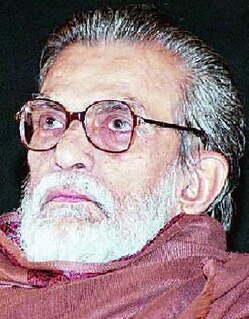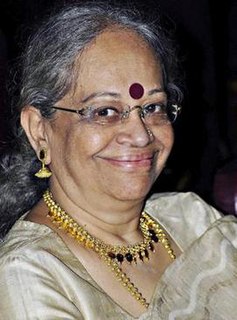See also
- Rag Boli Karnad, a village in Iran
Karnad is an Indian name that may refer to the following notable people:

Girish Karnad was an Indian actor, film director, Kannada writer, playwright and a Jnanpith awardee, who predominantly worked in South Indian cinema and Bollywood. His rise as a playwright in the 1960s marked the coming of age of modern Indian playwriting in Kannada, just as Badal Sarkar did in Bengali, Vijay Tendulkar in Marathi, and Mohan Rakesh in Hindi. He was a recipient of the 1998 Jnanpith Award, the highest literary honour conferred in India.
Samir is a male name found commonly in the Indian subcontinent, Middle East, Central Asia and Europe. In Arabic, Samir (سمير) means holy, jovial, loyal or charming companion. In Indian languages it is derived from the Sanskrit word Samir (समीर) meaning gust of wind or gentle breeze. Samira is the feminine spelling, also found in both languages.

Babukodi Venkataramana Karanth was a film and theatre personality from India. Throughout his life he was director, actor and musician of modern Indian theatre both in Kannada as well as Hindi, and one of the pioneers of Kannada and Hindi new wave cinema. He was born in Dakshina Kannada.
Girish is a Hindu name which means "lord of the mountain " in Sanskrit. This is a name of Lord Shiva, given because of his abode in the Himalayan Mountains.

Badal Sircar, also known as Badal Sarkar, was an influential Indian dramatist and theatre director, most known for his anti-establishment plays during the Naxalite movement in the 1970s and taking theatre out of the proscenium and into public arena, when he transformed his own theatre company, Shatabdi as a third theatre group. He wrote more than fifty plays of which Evam Indrajit, Basi Khabar, and Saari Raat are well known literary pieces. A pioneering figure in street theatre as well as in experimental and contemporary Bengali theatre with his egalitarian "Third Theatre", he prolifically wrote scripts for his Aanganmanch performances, and remains one of the most translated Indian playwrights. Though his early comedies were popular, it was his angst-ridden Evam Indrajit that became a landmark play in Indian theatre. Today, his rise as a prominent playwright in 1960s is seen as the coming of age of Modern Indian playwriting in Bengali, just as Vijay Tendulkar did it in Marathi, Mohan Rakesh in Hindi, and Girish Karnad in Kannada.

Ananda Bhairavi is a 1983 Indian bilingual dance film, simultaneously shot in Telugu and Kannada languages, written, and directed by Jandhyala. It starred Girish Karnad, Kathak dancer Malavika Sarkar, Rajesh Kumar and "Natyacharya" Bhagavathula Venkata Rama Sarma as a male classical dancer in this film. The film was premiered at International Film Festival of India. The film received positive reviews and has garnered the four state Nandi Awards.
Vamsha Vriksha, is a 1972 Indian Kannada-language film directed by B. V. Karanth and Girish Karnad, based on S. L. Bhyrappa's novel of the same name. The film won the National Film Award for Best Direction. It also won three Filmfare Awards in 1972.
Anto may either be a surname or given name. It is a Croatian diminutive form of Anton, Antonio and Antonijo that is used in Croatia. It is common in Ireland as a short version of Anthony.

Kaadu (Forest) is a 1973 Indian Kannada film written and directed by Girish Karnad. The screenplay was based on a novel of the same name by Srikrishna Alanahalli. It stars Master G. S. Nataraj, Amrish Puri and Nandini Bhaktavatsala in the lead roles. The film won awards at the 21st National Film Awards and the 21st Filmfare Awards South.

Kanooru Heggadithi is a 1999 Indian film based on the 1936 novel "Kanooru Subbamma Heggadithi" by Kannada writer Kuvempu, and directed by playwright and film director Girish Karnad. Set in the Malnad region, the film narrates a story of the land and life of a feudal family in pre-independence Malnad. The film marked Karnad's return to directing after a lapse of over a decade. This is the only instance in the Indian cinema history where one Jnanpith Awardee directed a movie based on the work of another Jnanpith Awardee.
K. S. Rao may refer to:

Uma Shivakumar was an Indian film and theatre character actress, who career included role in more than 170 Kannada language films and more than 30 plays. She was nicknamed "Baddi Bangaramma" by audiences, after the popular 1984 film of the same name, in which she portrayed a moneylender.
Odakalu Bimba is a Kannada monodrama by Indian playwright and author Girish Karnad. It was written in 2005 and marked Karnad's return to direction after a period of thirty years. He directed the play with KM Chaitanya
Sadashiv may refer to:

Raghu Karnad is an Indian journalist and writer, and a recipient of the Windham–Campbell Literature Prize for Non-Fiction. He is the author of Farthest Field: An Indian Story of the Second World War which was shortlisted for the Hessell-Tiltman Prize for 2016, and was awarded the Sahitya Akademi Yuva Puraskar for a writer in English the same year. His articles and essays have won international awards including the Lorenzo Natali Journalism Prize in 2008, the Press Institute of India National Award for Reporting on the Victims of Armed Conflict in 2008, and a prize from the inaugural Financial Times-Bodley Head Essay Competition in 2012.
Raghu or Reghu is an Indian masculine given name. Notable people with the name include:
Jahir a variant of Jair is a given name. It may refer to:
Amirtham is a 2006 Indian Tamil-language drama film produced, written and directed by K. Kannan, making his directorial debut. The film features newcomer Ganesh and Navya Nair in lead roles, with Girish Karnad, Anuradha Krishnamoorthy, Rajeev, Rekha, Yugendran and Madhura playing supporting roles. The film had musical score by Bhavatharini and was released on 10 February 2006.
Satish Chandra is a given name of Hindu origin, and may refer to,
Arjun Singh may refer to